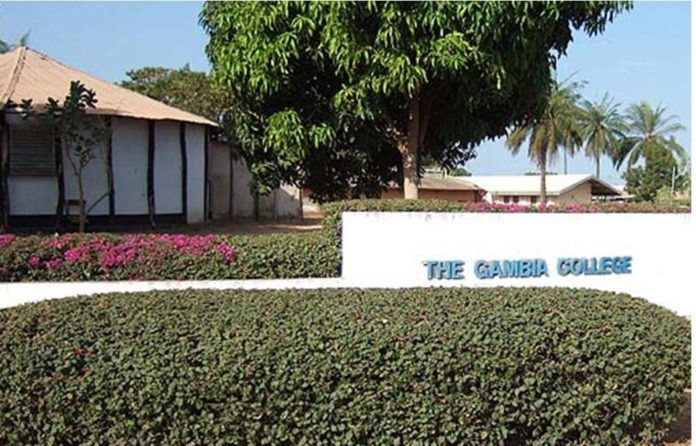By Nelson Manneh
Yielding to extraordinary measures amid extraordinary times caused by a global Covid-19 pandemic, The Gambia College joined the bandwagon of learning institutions that opted for the continuation of classes despite a health hitch.
The online classes the Gambia College initiated was triggered by the seemingly unending global Covid-19 pandemic that has forced learning institutions across the globe into having virtual lessons to ensure students continue to learn from home.
But the College seems to be grappling with the needed resources to cope with the demand for the novel learning initiative which is distance learning.
Yankuba Sowe, the President of the School of Nursing and Midwifery Students’ Association (SoNaMSA) – a sub-union at the Gambia College, has told Foroyaa that the management of the College did not brief them prior to the introduction of online classes and they don’t agree with some of the conditions the Management proffered for the distance learning programme.
Sowe said the most notable conditions differing students who would fail to attend the online classes and putting on extra charges on them when making up those lectures.
Mr. Sowe said the college promised to give each student 500 megabytes (MB) per month and it is a requirement that a student must have a number allocated to him/her by the Gambia College.
“We are committed to making sure that the promise the management of the College made prior to the online classes are met,” he said.
Scores of students have advocated for a sit down strike amid the introduction of the online classes. But Sowe said his school is not part of that bandwagon.
““We are not in for Strike,” Sowe said.
Sowe’s committee has engaged the management of the College through the main students’ union on several times, but there seem to be no positive or promising responses.
“We are not in for any strike, some students complained to us for us to engage the admin, the Ministry of Higher Education, the media and other stakeholders for support. Our position is clear as we have agreed to join the Main Union in the process, but not necessarily to stop the ongoing distance learning classes,” he said.
Sowe;s team is of the opinion that if the situation continues, they will engage the College’s main union and come up with an informed decision to that effect.
“In my own personal view, with regard to the effectiveness of the online classes, to me it is not balance because some students cannot afford the cost of megabytes and a lot of them struggled to attend classes due to the difficulties associated with the cost of megabytes.” he said.
His team has called for unity among the students. It is their view that it is through unionism they would be able to accomplish their ultimate goals.
Unlike Mr. Sowe, Abubacarr Danso, the Information Minister of the Gambia College School of Education said the management of the College engaged them prior to the introduction of online classes.
The College promised to give each student 500 megabytes but many students are yet to receive it. Many students are complaining that the online classes are not effective which according to Danso is true.
“The condition we found ourselves in, will determine our future action,” he said. 
Ready for Strike
Soto Jobe, the President of The Gambia College School of Agriculture Students’ Association (SASA) said they are considering strike as an option.
Jobe said if they run out of options, they will consider the students’ union position of embarking on a strike as the only possible solution for them to solve their problem.
“I will be ready for it (strike),” he said. “We have agreed to cease attending the online classes until the megabyte’s issue is settled because the college itself promised to give each student 500 MB in order for each to successfully follow the classes.”
Like many others, President Jobe said the online classes are not effective because majority of the students are not participating and most of them complained that they don’t have the means to always attend online classes. Jobe called on all students to stay away from the online classes.
“Online Classes A Compliment Not Replacement”
The leader of the Gambia College Students Union, Madam Seray Sidibeh, said as a union, they are doing their best to ensure all students have megabytes to enable them have access to their lessons.
President Sidibeh, a final year Public Health Student, said College Management promised to give each student 500 megabytes of data, but the process is slow.
Sidibeh said the online classes have been introduced two months ago, but the GSM operators have not been very helpful when it comes to the classes.
According to her, many factors are responsible for the delay in the online classes.
She said they were told that every student of the College was going to be provided with 500MB of data.
The student leader said they have been working with the administration of the college to ensure they fulfil their promise.
“As it is with most initiatives, the online classes were meant to compliment onsite education, not a replacement because they cannot be as effective as onsite classes,” she said.
Meanwhile, President Sidibeh said the first batch of students have received their megabytes and have access to the online applications.
“Every single student matter to us and we are still looking forward to making sure that all students have access to the distance learning platforms,” she said.
According to her, they have engaged the Ministry of Higher Education on the matter and they have been working with the college administration to resolve the issue.
Sidibeh said on 1st June, 2020, the Union in collaboration with the sub- associations agreed to boycott the online classes until megabytes and access to the applications were made available to students.
“This continued until June 10th, 2020, when megabytes were eventually provided for the first batch of students,” she said.
She noted that students were registering to get access to online classes, adding their executive will continue the engagement with the college authorities to make sure all students have access to online classes.
Providing 10, 000 Students Access To Online Classes
Mr Demba SM Yarbo registrar of the Gambia College said their institute has close to ten thousand students (10,000) within the four sister schools (the school of education, school of nursing, school of public health and school of agriculture).
Yabo said the online classes, contrary to the students’ claim, are effective.
He said they are dealing with four sister schools within the college and they have noticed that the online classes are effective in three of the schools, excluding the school of education- the largest among the others.
But dozens of students who spoke to Foroyaa said the classes are better not done than pursued because they are not benefiting from the classes as anticipated.
“The issue is that, considering the number of students in the school of education is about 80% of the number of students in the whole college, considering this number and their lack of access to the megabytes are what gave us problems because most of the students from this school from the onset have been complaining that they don’t have megabytes for them to commence their online classes,” he said.
Mr Yarbo said he thought students should have used their resources from the “onset” to buy megabytes in order to attend the online lessons.
His reason was that since the students were no longer attending classes, they could have used the savings they have made from expenses they used to incur such as fares and buy megabytes since some students were doing that.
Yabo said the issue was not about Gambia College and the GSM companies, but rather this was an emergency situation that affected lives and livelihood. He said countries that did not have good internet connectivity, found it difficult to conduct online classes, because both the learning institutes and the GSM companies were not prepared for it.
“We went to Gamcell, Qcell and Africell to negotiate with them about the megabytes issue, but Gamcell clearly told us that they cannot do it because looking at the number of students that are involved, their customers will suffer if they want to provide us with the service we are requesting for,” Yabo said.
Registrar Yabo said the College could not afford the sum Africell charged them.
“It is only Qcell GSM that is able to give us consensus that they will be able to take our students, but even with that, we have problems because supplying them with the list of the students and the details they need is a problem,” he said.
Yabo said so far they were able to send one thousand nine hundred and two (1, 902) names to Qcell and they were supplied with megabytes.
He said each student will be allocated 500 megabytes data each month which will last for two months.
“We asked the other students to send us their details, but we realise that some students do not have Qcell sim card. We were able to secure 200 Qcell sim cards and we informed students who do not have Qcell sim cards to come and collect one, but so far only about 2,000 students sent us their details and we are left with around 8,000 students who are not yet on board,” he said.
Yabo said the megabytes problem affected all the schools in the College, but the whole noise was coming from the school of education, charging that the school clamoured for a sit down strike dubbed ‘no megabytes no classes.’
Registrar Yabo said they will be submitting the second list of students to Qcell by Monday (22 June, 2020). He advised students who may not attend the online classes to get the lessons learned from their fellow students. He said they are ready for the online classes and that is why they engaged the Ministry of Higher Education on the matter.
“But people need to understand that it cannot be automatic,” he added.
The educationist urged the students to be patient. He encouraged those who can afford to buy megabytes to do so and follow the distance learning programme.
The Gambia College is one of the oldest Tertiary Institutes in The Gambia. The College comprises of four schools namely the School of Education, the School of Agriculture, School of Public Health and the School of Nursing and Midwifery.
The college has its main campus in Brikama and has two main annex, one in Banjul where Nursing and Midwiferies students are and the other annex in Basse.



















